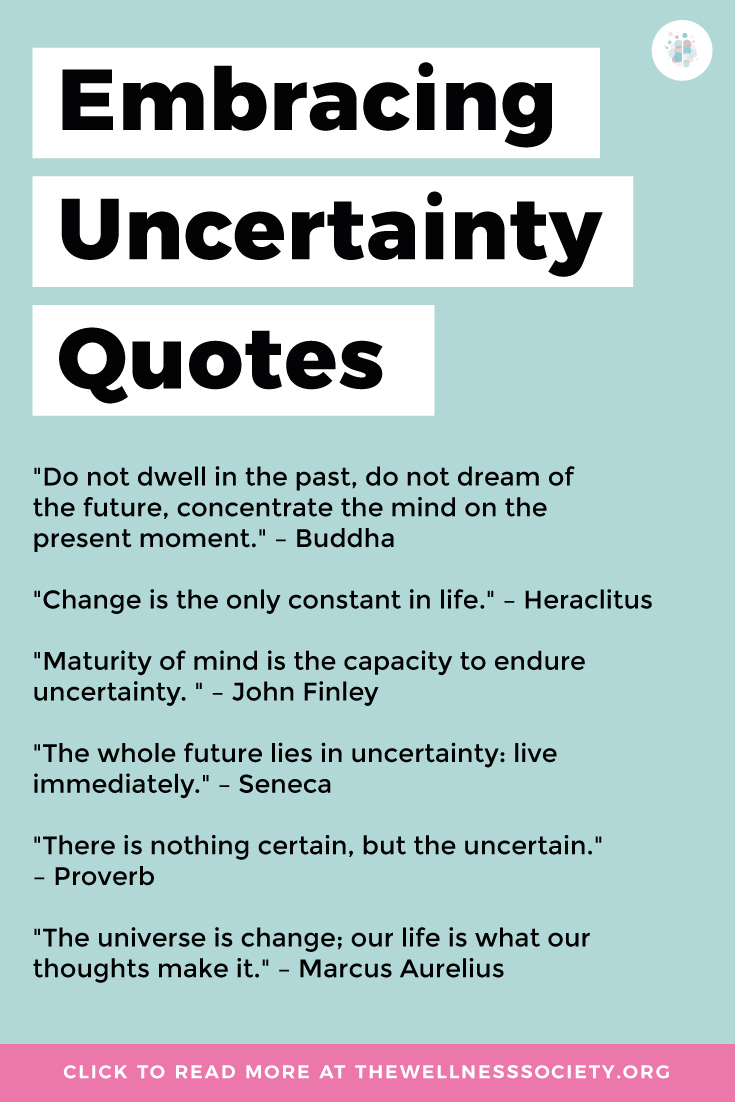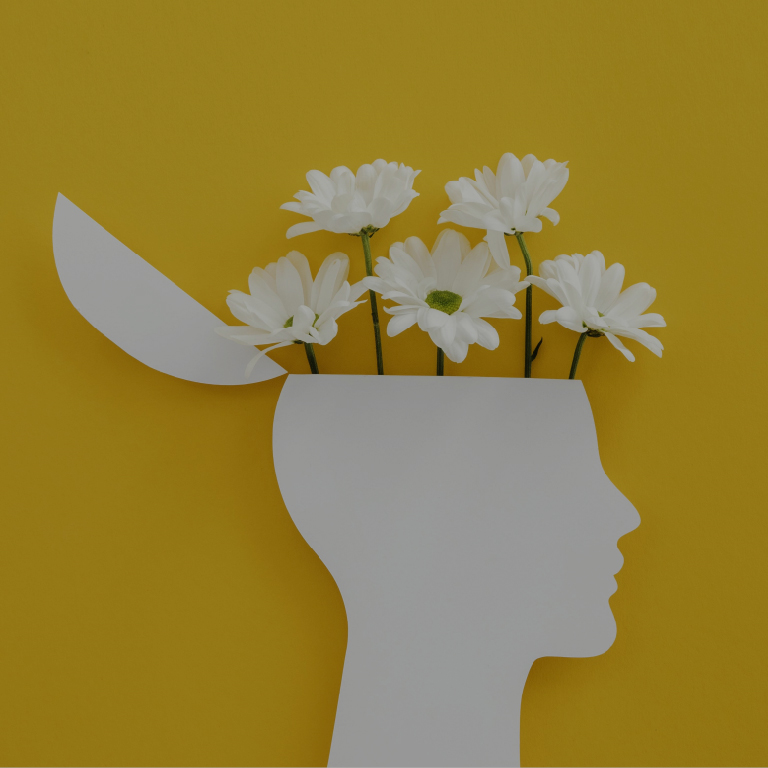We cannot escape uncertainty – it’s a fact of life. Whether it's facing unexpected changes, beginning a new life chapter, or questioning our decision making, uncertainty is an inevitable part of the human experience.
Our inherent need for control and predictability can make embracing uncertainty challenging. We’re wired to seek stability and security, and the unknown can trigger feelings of fear, doubt, and vulnerability.
Embracing uncertainty requires a shift in mindset that acknowledges that life is ever-changing, and that certainty is a fleeting illusion.
Many people find Buddhist philosophy and ideas helpful for accepting uncertainty. Buddhism emphasizes the concept of impermanence, teaching that all things, including situations and circumstances, are in a constant state of change. Recognizing the impermanent nature of all phenomena can help us navigate uncertainty with greater acceptance and understanding.
Mindfulness is also central to Buddhist philosophy. By being present, we stop ourselves from getting entangled in anxious thoughts or projections about the future.
Embracing Uncertainty Quotes
- "Change is the only constant in life." – Heraclitus
- "Uncertainty is the only certainty there is, and knowing how to live with insecurity is the only security." – John Allen Paulos
- "Maturity of mind is the capacity to endure uncertainty. " – John Finley
- "Don’t let your reflection on the whole sweep of life crush you. Don’t fill your mind with all the bad things that might still happen. Stay focused on the present situation and ask yourself why it’s so unbearable and can’t be survived." – Marcus Aurelius
- "The greatest obstacle to living is expectancy, which hangs upon tomorrow and loses today. The whole future lies in uncertainty: live immediately." – Seneca
- "When I see an anxious person, I ask myself, what do they want? For if a person wasn’t wanting something outside of their control, why would they be stricken by anxiety?" – Epictetus
- "There is nothing certain, but the uncertain." – Proverb
- "The universe is change; our life is what our thoughts make it." – Marcus Aurelius
- "Don’t demand or expect that events happen as you would wish them do. Accept events as they actually happen. That way, peace is possible." – Epictetus
- "The only way to make sense out of change is to plunge into it, move with it, and join the dance." – Alan Watts
- "Do not dwell in the past, do not dream of the future, concentrate the mind on the present moment." – Buddha
- "Accept what is, let go of what was, and have faith in what will be." – Sonia Ricotti
- "The only thing that makes life possible is permanent, intolerable uncertainty: not knowing what comes next." – Ursula K. Le Guin
- "The quest for certainty blocks the search for meaning. Uncertainty is the very condition to impel man to unfold his powers." – Erich Fromm
Embracing Uncertainty Using Non-Dualistic Thinking
Non-duality is a key concept in Buddhism that refers to a way of understanding the world that transcends the categorization of phenomena into opposing pairs, such as good and bad, right and wrong, or self and other.
It’s a philosophical perspective that recognizes the interconnectedness of all things, going beyond the labels and conceptual distinctions we tend to impose on the world. It emphasizes the idea that the divisions we impose are mental constructs and do not reflect the ultimate nature of reality.
Non-dualistic thinking encourages us to let go of rigid and fixed views about ourselves, others, and the world. This includes letting go of the idea that things should be certain or predictable. When we release our attachment to fixed outcomes or beliefs, we become more open to the fluidity of life and more accepting of uncertainty.
This kind of thinking helps us recognize that both positive and negative experiences are part of the natural ebb and flow of life. By embracing this perspective, we develop a greater sense of calm in the face of uncertainty.
Beginner’s Mind
Also known as "Shoshin" (初心) in Zen Buddhism, Beginner’s Mind is a concept that refers to approaching life with a fresh and open mind, free from preconceptions, judgments, and attachments.
It involves cultivating a mindset of curiosity and non-judgmental awareness, as if experiencing something for the first time.
In uncertain situations, rather than feeling overwhelmed or resistant, we adopt an attitude of curiosity and a willingness to explore. This mindset helps us adapt, grow, and discover new insights and perspectives.
Beginner's Mind encourages letting go of fixed ideas and being open to new possibilities. Rather than approaching situations with a mind filled with preconceived notions, Beginner's Mind allows for a direct and unfiltered experience of the present moment.
Cultivating Beginner's Mind can bring several benefits, such as increased creativity, enhanced learning, and a deeper appreciation for the richness of life.
How to Cultivate Beginner’s Mind
One exercise for cultivating Beginner's Mind is known as "Mindful Observation." Here's how you can practice it:
- Choose an everyday object. Start by selecting a common object from your surroundings. It could be a simple item like a pencil, a flower, a cup, or any other object you can easily observe.
- Set aside preconceptions. Approach the object as if you've never seen it before, even if it's something you're familiar with. Let go of any assumptions or knowledge you have about the object and approach it with a fresh perspective.
- Engage your senses. Take a few moments to fully engage your senses. Notice the shape, color, texture, and any other physical qualities of the object. Pay attention to its smell, if applicable. You can even lightly touch or hold the object to explore its tactile qualities.
- Observe mindfully. Direct your full attention to the object and observe it mindfully. Notice the details, patterns, and intricacies. Be present with the object without getting lost in thoughts or judgments.
- Stay curious. Maintain a sense of curiosity and wonder as you observe the object. Notice if there are any aspects you hadn't noticed before or if your perception of the object begins to shift. Embrace any new discoveries that arise.
- Expand awareness. While observing the object, expand your awareness to the space around it. Notice the relationship between the object and its environment. Observe how it interacts with light, shadows, or other objects nearby.
- Practice non-judgment. Throughout the exercise, cultivate a non-judgmental attitude. Allow the object to be as it is without labeling it as good or bad, beautiful or ugly. Simply observe and accept it without attaching any fixed judgments.
This exercise can be practiced for a few minutes or as long as you'd like. The key is to approach the object with a beginner's mind, letting go of assumptions, and engaging in a direct and curious observation.
Summary
Uncertainty is an inevitable part of life, yet our inherent need for control often leaves us resisting it and feeling anxious in the face of it.
You can embrace uncertainty by reminding yourself that the notion of certainty is in fact an illusion. Change is the only constant. Our fixed judgements of things as "good or bad" does not reflect the ultimate nature of reality, which is highly complex.
Practicing mindfulness, non-dualistic thinking and Beginner's Mind can prevent you from getting entangled in anxious thoughts and projections about the future.
A Toolkit to Help You Reduce Anxiety
Research shows that self-help materials are often enough for people to overcome mild to moderate mental health difficulties without professional support.
Our self-guided program includes tools from CBT, DBT, ACT and more, so you can discover what works best for you. Check out The Mental Wellbeing Toolkit today – it's "like 10 therapy sessions in one."

About Rebecca
Rebecca is the founder of The Wellness Society and author of two fluff-free books, The Framework and Understanding and Healing Trauma. She's passionate about creating concise and compassionate mental health and wellbeing tools that address the root causes of distress. Read more about her views on our About page.Pin For Later




